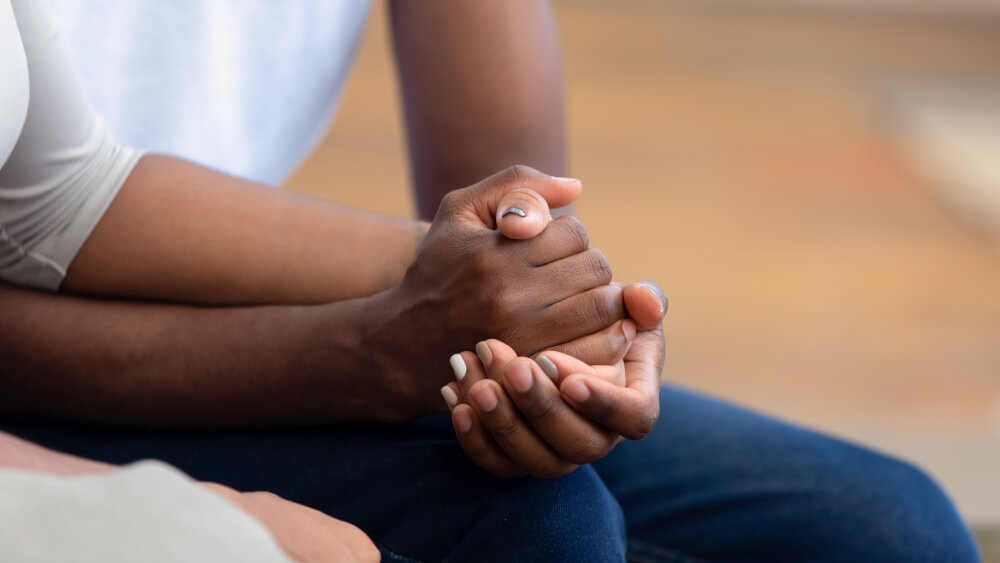Although early detection and treatment advances have significantly improved survival rates for patients with prostate cancer, the majority will face some form of sexual health side effect. Addressing these physical and emotional side effects is a priority for care teams at Dana-Farber.
But longstanding cultural barriers can often keep men from discussing sensitive issues like these or seeking out professional mental health.
“We don’t have a cultural focus on prostate cancer,” says Max McMahon, LICSW, a social worker at Dana-Farber who works with patients who have prostate cancer, and who is a follicular lymphoma survivor himself. “There’s a perception in society that it’s somehow ‘cancer light.’”

Sexual health effects mental health
Prostate cancer and its treatment can lead to serious physical and psychological challenges.
Surgery that aims to treat prostate cancer, such as a prostatectomy (a procedure that results in the partial or complete removal of the prostate), can damage nerves and lead to erectile dysfunction or urinary incontinence (uncontrolled leaking). A patient might have to wear pads for some time as function returns.
Hormone therapies that lower testosterone and are often used to treat prostate cancer, like androgen deprivation therapy, can also lower a patient’s libido.
In many cases, these side effects are temporary, but they can have a significant impact on a patient’s sexual confidence and sense of self, which can also lead to relationship concerns. Patients often struggle with feelings of frustration, anxiety, and self-esteem issues. These challenges should not be faced alone, and it can be beneficial to seek emotional and mental support through a social worker like McMahon or a support group. Groups, like those offered at Dana-Farber, are tailored to specific cancers and personal identities.
Relationships matter
It can be difficult for patients facing prostate cancer to ask for help. “Many men, especially men of a certain generation, sort of close down,” says McMahon. “They’re not going to talk about their feelings.”
But leaving serious mental and emotional struggles unaddressed will exacerbate them. To ensure that patients feel comfortable voicing their concerns, McMahon and the Dana-Farber team emphasize trust: not just between patient and social worker, but among the entire care team.
Social workers like McMahon deploy genuine curiosity and empathy to discuss the emotional impacts of cancer treatment, including how it affects a person’s sex life, relationships, work, and self-image, depending on the patient’s comfort level.
In sessions, McMahon asks direct questions and wants to understand how his patients experience everyday life; “What’s important to you? Can you give me snapshot of how you are doing? What are the things that you think about but may not express?” He says, “Being inquisitive and eliciting very sensitive concerns is humanizing, especially when there is anxiety, worry and suffering that may go unacknowledged.”
Sessions with a social worker can also contextualize and normalize a patient’s stressors. “I talk about this with guys every day,” says McMahon. “Even if what they are facing is distressing, it’s always helpful to say, ‘What you’re experiencing is what other guys are experiencing.’”
McMahon also works closely with the physicians in the Lank Center for Genitourinary Oncology at Dana-Farber Brigham Cancer Center to ensure that patients are receiving the best care possible. This means acting as a sort of liaison with the wider care team and raising mental and emotional concerns as they arise, as well as facilitating connections with resources to alleviate symptoms.
Working together with the care team, McMahon hopes that patients move on from Dana-Farber to return to “a life that feels meaningful and grounded.”
“A cancer diagnosis and treatment are really disruptive,” he says. “It throws everything out of whack and becomes the primary burden. The hope with treatment is that that burden can recede so instead of taking up the metaphorical living room, it takes up the back office. My hope is that patients come out of the experience with some insights and connections that will offer them meaning.”

This is what I am planning to do in South Africa: To help people affected by the side effects of prostate cancer. I can’t separate their internal pain from me. I am an ONC. RN. That is my passion and I realised that it is the sensitive issue which needs to be addressed.